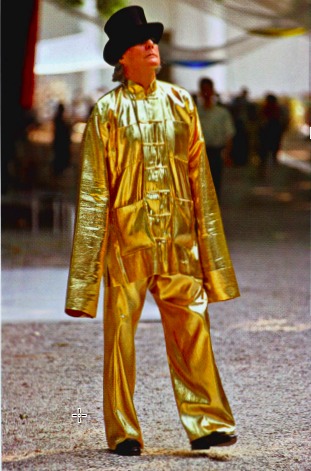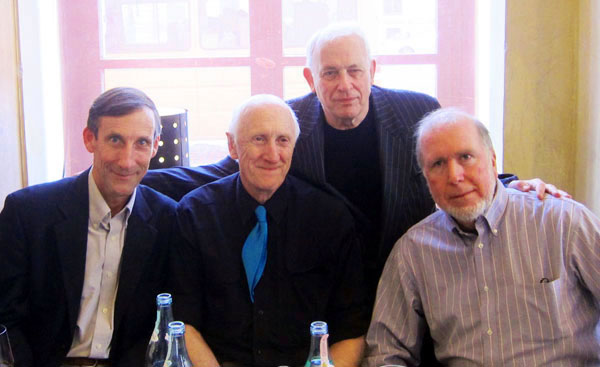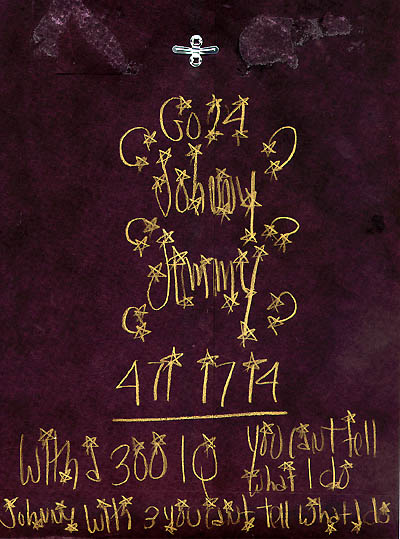Edge.org was launched in 1996 as the online version of "The Reality Club" and as a living document on the Web to display the activities of "The Third Culture."
THE REALITY CLUB
The Reality Club was an informal gathering of intellectuals who met from 1981 to 1996 in Chinese restaurants, artist lofts, investment banking firms, ballrooms, museums, living rooms and elsewhere. Reality Club members presented their work with the understanding that they will be challenged. The hallmark of The Reality club has been rigorous and sometimes impolite (but not ad hominem) discourse. The motto of the Club was inspired by the late artist-philosopher James Lee Byars: "To arrive at the edge of the world's knowledge, seek out the most complex and sophisticated minds, put them in a room together, and have them ask each other the questions they are asking themselves."
I met Byars in 1969 when he sought me out after the publication of my first book, By the Late John Brockman. We were both in the art world, we shared an interest in language, in the uses of the interrogative, in avoiding the anesthesiology of wisdom, and in "the Steins"—Einstein, Gertrude Stein, Wittgenstein, and Frankenstein ("the shtick of the Steins"). In 1971, our dialogue ("Jimmie and Johnny"), informed the creation by James Lee of The World Question Center.

James Lee Byars (1932-1997), Founder of The World Question Center
I wrote the following about his project at the time of his death in Egypt in 1977:
James Lee inspired the idea that led to the Reality Club (and subsequently to Edge), and is responsible for the motto of the club. He believed that to arrive at an axiology of societal knowledge it was pure folly to go to a Widener Library and read 6 million volumes of books. (In this regard he kept only four books at a time in a box in his minimally furnished room, replacing books as he read them.) This led to his creation of the World Question Center in which he planned to gather the 100 most brilliant minds in the world together in a room, lock them behind closed doors, and have them ask each other the questions they were asking themselves.
The expected result, in theory, was to be a synthesis of all thought. But between idea and execution are many pitfalls. James Lee identified his 100 most brilliant minds (a few of them have graced the pages of this Site), called each of them, and asked what questions they were asking themselves. The result: 70 people hung up on him.
That was in 1971. New technologies = new perceptions. Email, the Web, mobile devices, social media, today allow for a serious implementation of Jimmy Lee's grand design. Though the venue is now online, the spirit of the Reality Club lives on in the lively back-and-forth discussions on the hot-button ideas driving the discussion today.
"To arrive at the edge of the world's knowledge, seek out the most complex and sophisticated minds, put them in a room together, and have them ask each other the questions they are asking themselves."
As James Lee said: "To accomplish the extraordinary, you must seek extraordinary people." At the centre of every Edge project are remarkable people and remarkable minds— scientists, artists, philosophers, technologists and entrepreneurs who are at the center of today's intellectual, technological, and scientific landscape. They are representative of The Third Culture I wrote about in "The Emerging Third Culture," a 1991 essay, and a book, The Third Culture: Beyond the Scientific Revolution, published in 1995.
THE THIRD CULTURE
The third culture consists of those scientists and other thinkers in the empirical world who, through their work and expository writing, are taking the place of the traditional intellectual in rendering visible the deeper meanings of our lives, redefining who and what we are.
It is a large enough umbrella to also include the "digerati," the doers, thinkers, and writers, connected in ways they may not even appreciate, who have tremendous influence on the emerging communication revolution surrounding the growth of the Internet and the Web.
Edge is a living document on the Web that displays "the third culture" in action. The "content" of Edge is the group of people who connect in this way. Edge is a conversation.
The ideas presented on Edge are speculative; they represent the frontiers of knowledge in the areas of evolutionary biology, genetics, computer science, neurophysiology, psychology, and physics. Some of the fundamental questions posed are: Where did the universe come from? Where did life come from? Where did the mind come from? Emerging out of the third culture is a new natural philosophy, founded on the realization of the import of complexity, of evolution. Very complex systems,, whether organisms, brains, the biosphere, or the universe itself, were not constructed by design; all have evolved.
There is a new set of metaphors to describe ourselves, our minds, the universe, and all of the things we know in it, and it is the intellectuals with these new ideas and images, those scientists and others doing things and writing their own books, who drive our times.
The third culture consists of those scientists and other thinkers in the empirical world who, through their work and expository writing, are taking the place of the traditional intellectual in rendering visible the deeper meanings of our lives, redefining who and what we are.
Through the years, Edge has had a simple criterion for choosing contributors. We look for people whose creative work has expanded our notion of who and what we are. A few are bestselling authors or are famous in the mass culture. Most are not. Rather, we encourage work on the cutting edge of the culture, and the investigation of ideas that have not been generally exposed. We are interested in "thinking smart"; we are not interested in received "wisdom." In communications theory information is not defined as data or input but rather as "a difference that makes a difference.'' It is this level we hope our contributors will achieve.
Edge encourages people who can take the materials of the culture in the arts, literature, and science and put them together in their own way. We live in a mass-produced culture where many people, even many established cultural arbiters limit themselves to secondhand ideas, thoughts, and opinions. Edge consists of individuals who create their own reality and do not accept an ersatz, appropriated reality. The Edge community consists of people who are out there doing it rather than talking about and analyzing the people who are doing it.
Edge bears resemblance to the early seventeenth-century Invisible College, a precursor to the Royal Society. Its members consisted of scientists such as Robert Boyle, John Wallis, and Robert Hooke. The Society's common theme was to acquire knowledge through experimental investigation. Another inspiration is The Lunar Society of Birmingham, an informal club of the leading cultural figures of the new industrial age — James Watt, Erasmus Darwin, Josiah Wedgwood, Joseph Priestley, and Benjamin Franklin. While different than the Algonquin Roundtable or Bloomsbury Group, Edge offers the same quality of intellectual adventure.
In the words of the novelist Ian McEwan, edge.org is "open-minded, free-ranging, intellectually playful… an unadorned pleasure in curiosity, a collective expression of wonder at the living and inanimate world… an ongoing and thrilling colloquium."
At the end of the year in 1999, for the first anniversary edition of Edge, I asked a number of the "Edgies" to use the interrogative. I asked "the most subtle sensibilities in the world what question they are asking themselves." We've been doing it annually ever since.
I work with three of the original Edgies who year in and year out provide the core sounding board for the ideas and information we present to the public. I refer to them in private correspondence as "The Council." Every year, beginning late summer, I consult with Stewart Brand, Kevin Kelly, and George Dyson, and together we create the Edge Annual Question that Edge has been asking for the past fourteen years.
Stewart Brand is the founder and editor of Whole Earth Catalog and author of Whole Earth Discipline; Kevin Kelly helped to launch Wired in 1993 and is the author of Out of Control and What Technology Wants; and George Dyson, a science historian, is the author of Darwin Among the Machines and Turing's Cathedral. This year, Laurie Santos, Associate Prefessor of Psychology, and Director of the Comparative Cognition Library at Yale, became involved, adding to the mix her keen intellect as well as a wide range of contacts among the leading thinkers of her generation.

George Dyson, Stewart Brand, John Brockman, Kevin Kelly
It's not easy coming up with a question. James Lee, used to say: "I can answer the question, but am I bright enough to ask it?" We are looking for questions that inspire answers we can't possibly predict. Our goal is to provoke people into thinking thoughts that they normally might not have.

We pay a lot of attention to framing the question and soliciting early responses from individuals who can set a high bar. This is critical. These responses seed the site and challenge and encourage the wider group to think in surprising ways. The conversation goes on, and on, for weeks, then months, as we widen the circle and invite more Edgies in to test the question under consideration and hear new ideas. Twice, at the very last minute, an idea pops up, so obviously right that we scrap months of work and just go with it.
This was the case with research psychologist Steven Pinker's 2012 question: "What Is Your Favorite Deep, Elegant, Or Beautiful Explanation?", and with theoretical psychologist Nicholas Humphrey's 2005 question "What Do You Believe Is True Even Though You Cannot Prove It?", which earned him the title of "Edge Question Laureate", and about which BBC4 Radio noted: "Fantastically stimulating...It's like the crack cocaine of the thinking world.... Once you start, you can't stop thinking about that question."
The online publication of the annual question occurs in mid-January, and in recent years it is followed in a little more than a year by a printed book. Last year we worried about worrying by asking"What Should We Be Worried About?". This year's question comes out of "HeadCon 13" What's New In Social Science", a two-day Edge seminar that took place in September last year. At one point, psychologist Laurie Santos mentioned to the group that she was interested in why there was no mechanism in social science for retiring ideas in order to make room for new initiatives.
A lively discussion followed and it became quickly picked that Santos was on to a possible Edge Question. After two weeks of intense conversations, several Edgies expressed concern that the danger with a question about retiring ideas is that the responses could go negative and that some might see it as an invitation to trash rivals. Others pointed out that this is the case every year, that no matter what question is asked. We decided to go with the question after one Edgie emailed the following comment which tipped the balance: "Science is argument, not advertising."
I am pleased to present the Edge Question 2014, asked by Laurie Santos.
